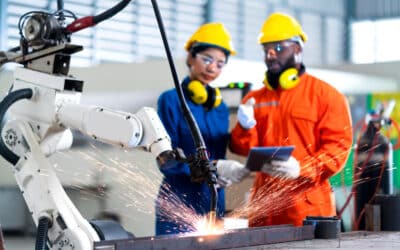In 2023, there will be many challenges that manufacturers will need to overcome. Energy prices and inflation will be among the biggest challenges. Other challenges include:
- Supply chain challenges
- Increased transport costs
- Less foreign investment
Energy prices
The impact of increasing energy prices on manufacturers is showing no sign of slowing in 2023. The new energy relief scheme, set to be introduced in April 2023 for non-domestic customers, is expected to increase planned reductions in staff and production. This is because manufacturers are prioritising investing in technology to improve the efficiency of their operations whilst also reducing costs and time spent on manufacturing tasks.
According to the 2023 Make UK/ PwC Senior Executive survey, 70% of manufacturers expect their energy costs to increase in 2023. 66% are expecting to reduce staff and production despite the government’s energy support package.
Supply chain challenges
In 2023, it is highly likely that global supply chain issues will remain whilst the conflict in Ukraine is ongoing. Sourcing and purchasing materials and fulfilling and distributing orders will remain to be a key issues for manufacturers in 2023. Supply chain issues are one of the main reasons why manufacturers are investing in digital technology. Digital technology such as VR & AR allows manufacturers to design products with little to no wastage, allowing manufacturers to be more efficient with their usage of materials.
Increased transport costs
Due to the increased costs of fuel in 2022, transport costs for manufacturers have increased dramatically which makes exporting goods more expensive which is eating into profit margins. Manufacturers will need to review and optimise their transport costs. For example, ensuring that HGVs and shipping containers are full to make the most of their transport costs.
Investment opportunities
Due to the political turbulence in 2022, 43% of companies believe that the UK is now less attractive to foreign investors. Therefore, those manufacturers that are looking for an investment may find it more difficult to find a suitable investor. This could prove to be a significant challenge for UK manufacturers that named investing in deep tech solutions and a commitment to innovation as their top priority in 2023. Some manufacturers may require investment in order to achieve this.
Conclusion
To conclude, inflation, energy prices, supply chain issues, transport costs and fewer investment opportunities will be the main challenges that manufacturers will look to overcome in 2023.
More from our manufacturing experts
You can find all of our latest manufacturing sector news and newsletters here.
If you are looking for advice in a particular area, please get in touch with your usual Hawsons contact.
Alternatively, we offer all new clients a free initial meeting to have a discussion about their own personal circumstances – find out more or book your free initial meeting here. We have offices in Sheffield, Doncaster and Northampton.
Related content
Government launch Critical Imports and Supply Chain Strategy
Responding to recent import and supply chain challenges, on 17 January 2024 the UK government launched the Critical Imports and Supply Chain Strategy, an initiative aimed at improving the nation's ability to adapt to global disruptions in the face of adversity. ...
UK government publish Advanced Manufacturing Plan
On 26th November, HMRC's Department for Business & Trade unveiled its much-anticipated Advanced Manufacturing Plan. This plan was released shortly after the chancellor announced £4.5 billion in funding for growth and innovation in the manufacturing sector. The...
Manufacturing challenges 2024 – manufacturers show increased optimism
Challenges for the manufacturing sector in 2024 As we start 2024, the manufacturing industry finds itself at a crossroads of various customer demands, technological advancements and sustainability imperatives. Whilst this may present opportunities, it will also leave...




